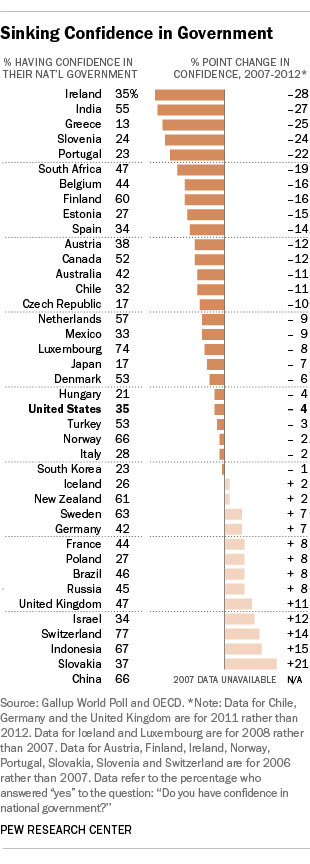
Among the casualties of the global financial crisis — along with millions of people’s homes, retirement nest eggs and general sense of personal economic security — has been public trust in national governments worldwide.
Between 2006-2008 and 2011-2012, confidence in government fell by at least six percentage points in 18 of the 34 member nations of the Organization for Economic Cooperation and Development, according to Gallup data compiled in a new report, “Government at a Glance 2o13.” The steepest drop was in Ireland, where the share of people answering “yes” to the question “In this country, do you have confidence in each of the following, or not? How about national government?” tumbled from 63% in 2006 to 35% six years later.
On average, just 40% of people in OECD countries said they had confidence in their national governments, down from an average of 45% in 2007. Confidence levels ranged from 77% in Switzerland to 13% in Greece; in the U.S., confidence was 35%.
Public confidence in government was higher in the so-called BRIICS countries — Brazil, Russia, India, Indonesia, China and South Africa — averaging 54%, about the same as in 2007 (though there was no earlier reading for China). That was despite a 27-percentage-point fall in government confidence in India, from 82% to 55%.
Why is declining confidence in government important? Without a core level of public trust, the report said, governments have trouble carrying their basic functions, not to mention implementing sometimes-painful economic and fiscal reforms. In addition, people and businesses “can also become more risk-averse, delaying investment, innovation and employment decisions that are essential to regain competitiveness and jumpstart growth.”
While people in the OECD countries may have relatively low confidence in their national leaders, they generally have higher opinions of specific public services. In all but one (Mexico), for instance, at least half of people said they were satisfied with local police, according to the section of the report with country-specific details; the average satisfaction level was 72%.
On average, 71% of people in the surveyed countries said they were satisfied with their health care, 66% with the education system and 51% with the judiciary. Overall, the Swiss, Norwegians and Danes expressed the greatest satisfaction with their public services; the Greeks, Mexicans and Chileans the least.